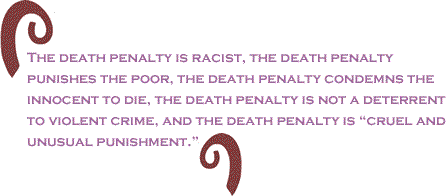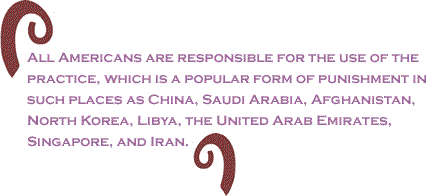When
the State of Georgia killed Troy Davis last week, it demonstrated
to the world that there are some aspects of American life
that never left the state of barbarism.
One
might be justified in singling out the individual states
that have killed the most people over the past few decades,
when many states have either outright banned the use of
such punishment or have allowed the death penalty to wither
away, in a de facto abolition of the death penalty.
That
would be dodging our responsibility as a nation.� While
states like Georgia, Texas, Oklahoma, Florida, and Virginia
might be the leaders in the use of state-sanctioned killing,
in a real sense, all Americans are responsible for the use
of the practice, which is a popular form of punishment in
such places as China, Saudi Arabia, Afghanistan, North Korea,
Libya, the United Arab Emirates, Singapore, and Iran.
According
to Amnesty International, 137 countries have abolished the
death penalty.� Of course, the U.S. is not one of them.
�That puts this country in the company of nations that oppress
their people.�
The
Campaign to End the Death Penalty, a nationwide organization,
puts its opposition succinctly.� They list five reasons
for ending legal state killing:� The death penalty is racist,
the death penalty punishes the poor, the death penalty condemns
the innocent to die, the death penalty is not a deterrent
to violent crime, and the death penalty is �cruel and unusual
punishment.�
There
are numerous organizations in the country that have fought
to end the use of the death penalty.� Whether it is because
of the continuing work of these groups or the realization
by the American people that it is a deeply flawed system,
the number of persons convicted of murder and other serious
crimes who have been sentenced to death has been dropping
in the past several years.� The number of death sentences
handed down in the nation as a whole has dropped considerably
over the past two decades.� It was reported to be 315 death
sentences in 1995, 128 so sentenced in 2005, and 102 sentenced
to die in 2006.�
Only
13 states had abolished the death penalty by 2007, in addition
to the nation�s capital, Washington, D.C.� In the rest of
America�s jurisdictions, the law often is applied arbitrarily
and people of questionable ability to understand either
the charges against them or the finality of their death
sentence are killed in the context of law.�

A
32-year study by M. Watt Espy Jr. and John Ortiz Smykla
of America�s death penalty record, from 1608 to 2002, indicates
how skewed the numbers are when it comes to who are in jail
or prison and the unevenly applied instances over the centuries
in America of the death penalty.
Here
is the racial breakdown of their study of those who have
been sentenced to death, since 1608:� Asian, 1 percent;
black, 50.5 percent; Hispanic, 2.5 percent; Native American,
2.5 percent, and white, 43.5 percent.�� As many other studies
have shown, America�s prisons are full of people of color,
mostly African-Americans.� The Innocence Project, which
has been freeing prisoners for two decades through the use
of DNA testing and comparisons, has seen to the release
of 273 persons, 17 of whom served time on death row.� And
the races of those exonerated were:� 166 African-Americans,
81 Caucasians, 20 Latinos, 2 Asian-Americans, and four whose
race was unknown.
That
a relatively small group with limited funds could go up
against the power and money of the prosecutorial system
in 50 states and win indicates that there are untold numbers
of people behind bars who also are innocent.� Tampering
with evidence, forced confessions, provision of inadequate
or incompetent defense representation, the reliance on false
witnesses, and many other acts against justice for the accused
all result in prisons containing many who have been wrongly
convicted.
That�s
why the execution of Troy Davis last week was such a miscarriage
of justice.� Now, though, the decision of the state to kill
him is irrevocable.� There were so many questions raised
about the prosecution of his case by thousands who believed
him to be innocent of the charge of murder.� Much of the
evidence was circumstantial (there was no gun found) and
witnesses at trial later said that they had been coerced
by the police to give testimony against him.� Seven of nine
witnesses recanted their testimony and there is suspicion
that one of the remaining witnesses had actually committed
the crime.
There
will never be a chance for The Innocence Project or anyone
else to save Troy Davis� live by proving him innocent.�
He could be proven innocent, but nothing that is
done will bring him back.� That is what proponents of abolition
of the death penalty have said for decades, that, if an
innocent person is killed by the state, there is no way
to right that wrong.

The
family of Mark MacPhail, an off-duty police officer, said
what families often say in such cases.� They said they wanted
closure, but vengeance is not closure.� Not a family member
apparently ever considered that Georgia might be killing
an innocent man.� They said they wanted peace, but peace
cannot be obtained through the killing of yet another human
being.� They said they wanted the Davis family to understand
and feel what they have gone through for the past 20 years,
but the MacPhails can�t ever know what it is like to have
a son and brother on death row, believing every day that
he is innocent and, ultimately, standing helplessly by as
the state executes.
People
must be proven guilty �beyond a shadow of a doubt,� to get
a conviction.� That�s the law.� In the process of appeals,
Troy Davis was told to prove his innocence, which is not
how the system of justice works.� But, even with the doubts
that came to light and the cracks that appeared in the legal
case, no one would give Troy Davis the chance at another
trial, with witnesses who would tell the truth.� There might
have been a chance (might still be a chance) to prove that
someone else killed Mark MacPhail.� Even if that does happen,
it won�t make much difference to Troy Davis or his family.
In
all of this, the press played a considerable part.� In stories
about Troy Davis, the press frequently interviewed the bereaved
family and the thing that the reader or viewer would take
away from the appearances was that Troy Davis was guilty
and they just wanted the whole thing to be over, meaning
that he should be executed and be done with it.� Even the
slain officer�s son, who was only a few months old at the
time of his father�s murder, was absolutely certain that
Troy Davis was the murderer and should be executed.� There
was no doubt of his guilt in the minds of the MacFail family.�
The press, or media, allowed the family to have what was
to have been the final decision on Davis� death:� He should
be killed without any further delay and no amount of doubt
about the circumstances of his conviction or the potential
injustice of the case should be considered.
For
readers and viewers, that was the character of the case
as presented by the media.� Yes, there were thousands, in
this country and around the world, who were asking that
Troy Davis be spared, because of the apparent flaws in the
prosecution�s case against him.� In fact, one prosecutor
was quoted as having said that he would not now try the
Davis case as a capital crime, but nothing was said or done
to try to keep him from the death chamber by officials who
might have felt that way.
As
it becomes more and more clear that the death penalty is
unevenly applied in America, with people of color paying
the greatest price in a system that is often unjust, the
general population has become more against the use of such
an extreme and barbaric method of punishment.� Even so,
there are nearly three dozen states, which still have the
death penalty on the books, even though they may use it
less frequently.� In Illinois, under a Republican governor,
George Ryan, a moratorium on use of the death penalty was
enacted years ago and, earlier this year, the state abolished
the death penalty, commuting to life sentences the 15 inmates
who remained on death row.� The reasons cited included the
legal system itself and the way capital punishment was applied,
in a state, which had one of the biggest populations on
death row.

About
four years ago, three newspapers, two of them influential
among the nation�s papers, called for abolition of the death
penalty, the Chicago Tribune, the Sentinel in Pennsylvania,
and the Dallas Morning News.� The Tribune, for example,
had supported the death penalty since 1869, but the examination
of the law by reporters at the paper resulted in stories
about the uneven, unfair, and unjust application of the
penalty and the paper responded accordingly.�
Progress
is being made against the death penalty in America, but
it is slow, too slow for people like Troy Davis.� Use of
capital punishment can be supported only by people who care
nothing about the real possibility (even, the likelihood)
that innocent men and women will be executed.� Slowly, through
groups like The Innocence Project, Americans are coming
to the realization that the injustice in the system is inherent
and that a modern society cannot tolerate a system that
inevitably kills the innocent.
President
Jimmy Carter, one of many prominent world figures who urged
Georgia�s pardons board to block the execution, was quoted
by the Associated Press about the Troy Davis execution:�
"If one of our fellow citizens can be executed with
so much doubt surrounding his guilt, then the death penalty
system in our country is unjust and outdated." said
Carter.�

BlackCommentator.com
Columnist, John Funiciello, is a labor organizer and former
union organizer. His union work started when he became a
local president of The Newspaper Guild in the early 1970s.
He was a reporter for 14 years for newspapers in New York
State. In addition to labor work, he is organizing family
farmers as they struggle to stay on the land under enormous
pressure from factory food producers and land developers.
Click here
to contact Mr. Funiciello.
|

